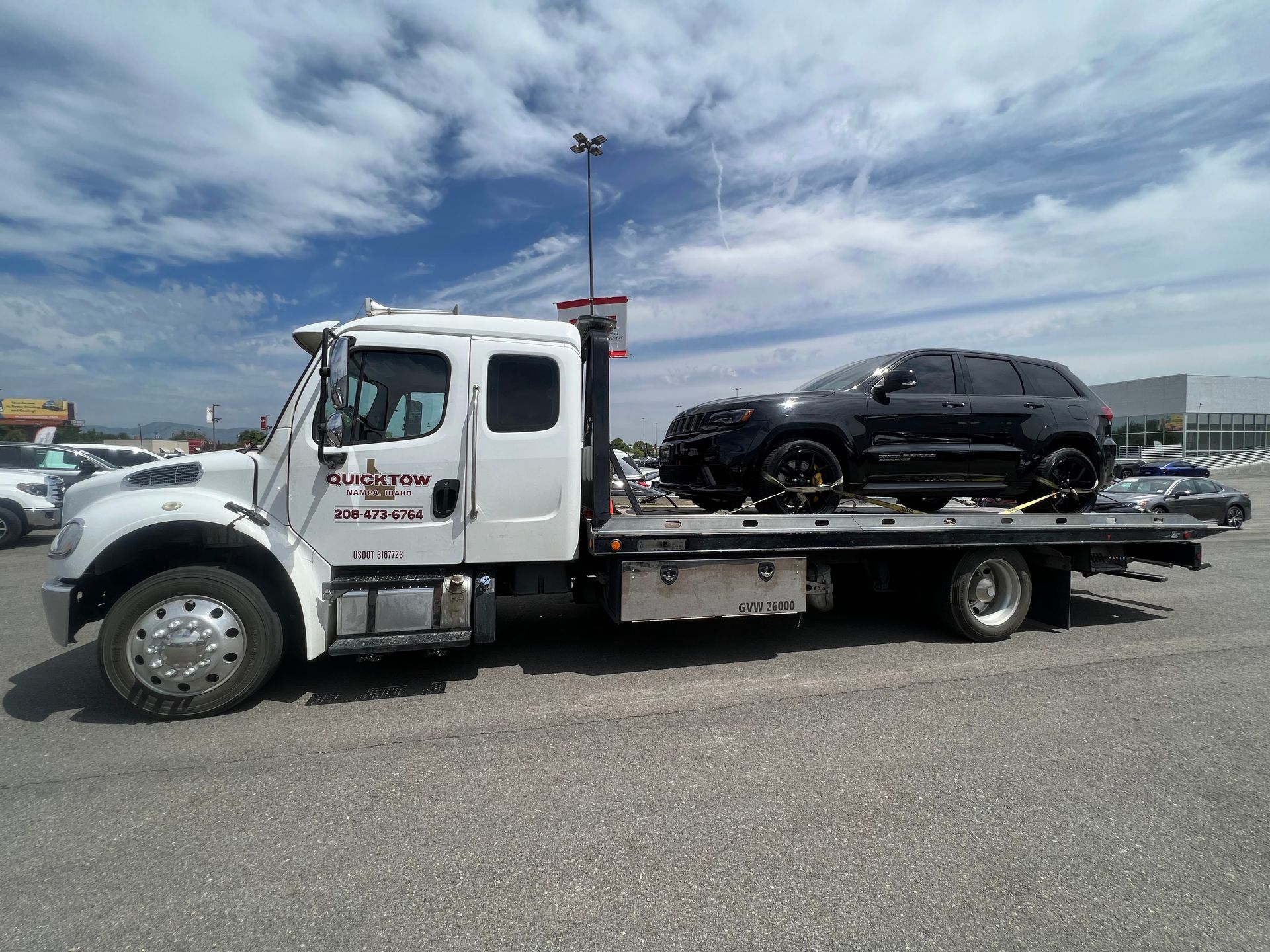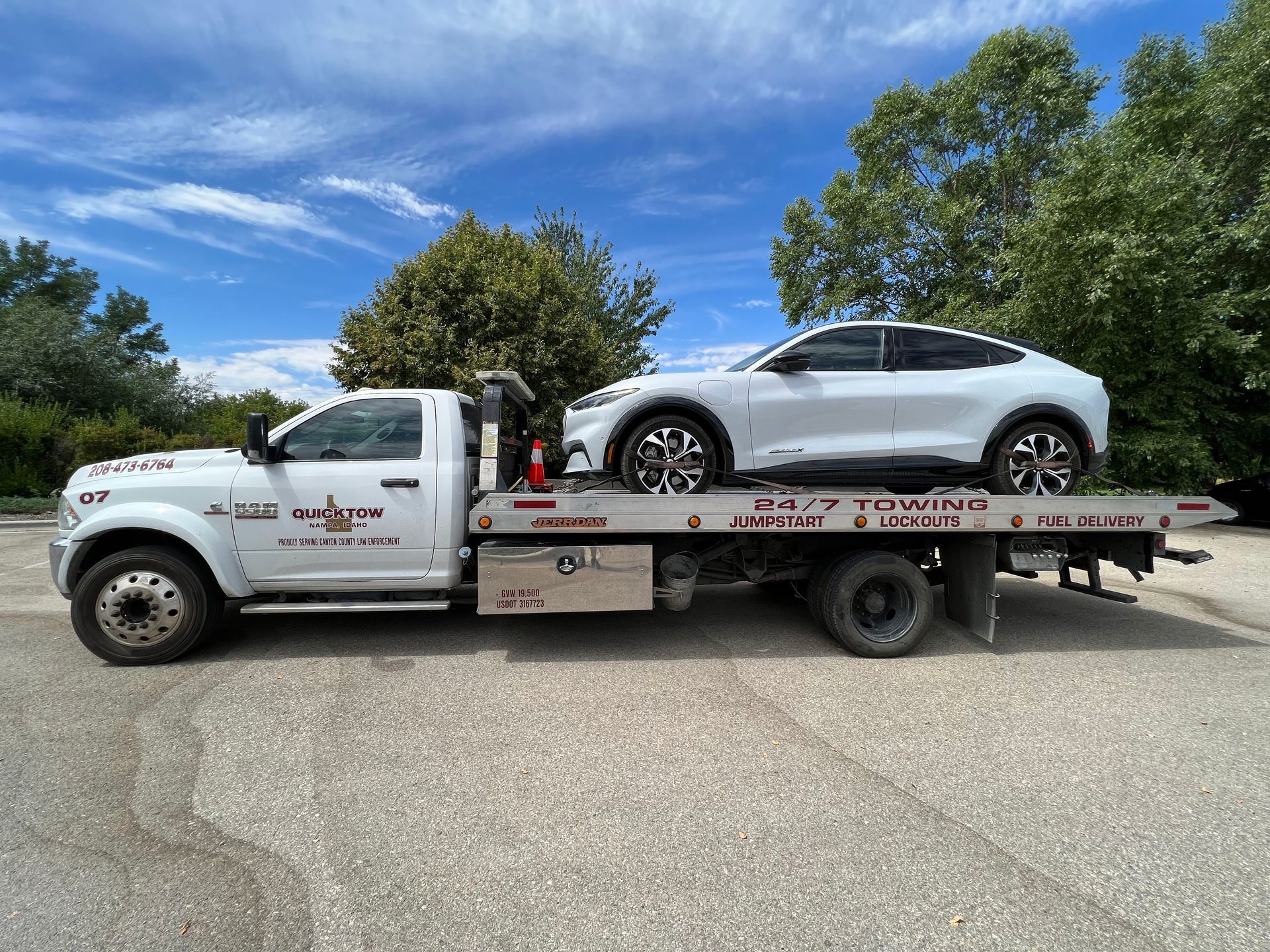The How to Tow a Car Guide: What Do You Need
Towing a car with a truck can feel like a heroic feat, especially when you're the one with the truck and a friend needs a lift. But let's face it, towing isn't as simple as hooking up and driving off. It's a delicate dance between being helpful and accidentally playing bumper cars with your truck and the car in tow. In this guide, we're going to walk you through the ins and outs of towing a car the right way. We'll cover the essentials and steer clear of the common pitfalls, ensuring your towing experience is smooth, safe, and free from any unwanted surprises. If you need Boise tow truck, we can help. We do car and motorcycle towing throughout the entire area including Meridian, Nampa, Caldwell, and Kuna.
How to Tow a Car With a Truck
Towing a car with a truck involves several important steps and considerations to ensure safety and prevent damage to either vehicle. Here's a general overview of the process:
● Check Towing Capacity: Before you tow anything, make sure your truck is capable of towing the car in question. Each truck has a maximum towing capacity, which you can find in the owner's manual or manufacturer's website. Exceeding this limit can cause significant damage to your truck.
● Use the Right Equipment: You'll need a tow strap or tow bar, and for larger vehicles, a tow dolly or trailer might be necessary. Ensure that the equipment is rated for the weight of the car you're towing. Also, gather safety chains, a hitch, and brake lights that can sync with your truck's system.
● Connect the Cars Properly: Attach the tow strap, bar, dolly, or trailer to your truck's hitch. Then, securely attach the other end to the towed vehicle's frame or designated towing points—not to the bumper or any part that could easily be damaged. If using a dolly or trailer, make sure the car is properly mounted and secured.
● Check the Brakes and Lights: Make sure that both the truck's and the towed vehicle's brake lights and indicators are synchronized and working. This is crucial for safety, especially on public roads.
● Plan Your Route: Towing affects how you drive, including your turning radius and stopping distance. Plan a route with less traffic and avoid tight turns and steep inclines, if possible.
● Driving with a Tow: Start slowly and increase speed gradually. Avoid sudden stops and starts, as this can cause the towed vehicle to collide with your truck. Keep your movements smooth and give yourself extra time and space for everything, especially turning and stopping.
● Regular Checks: Periodically stop in a safe place to check the connections, lights, and the position of the towed car. Make sure everything is secure and functioning correctly.
● Understand the Law: Different places have different rules about towing. Check the legal requirements for towing in your area, including whether you need additional mirrors, lighting, or a special license.
● Practice Safety: Always prioritize safety. If you're not confident in your towing abilities or if the setup doesn't seem secure, seek professional assistance.
If you find yourself struggling to tow a car with your truck, don't worry – we've got you covered. Whether it's an emergency situation or you're planning ahead, our professional towing services are available to help. We understand that towing can be a complex and sometimes overwhelming task, which is why we're here to provide a reliable, safe, and efficient alternative. Our team is equipped to handle all your towing needs, ensuring your vehicle gets where it needs to go without any hassle.
Things to Consider Before Towing a Car
When considering towing a car with your truck, it's vital to first understand the towing capacity of your truck. This isn't just a recommendation; it's a critical safety measure. Overloading your truck with a weight it's not built to handle can lead to significant mechanical failures and jeopardize your safety on the road. Also, the type of equipment you use for towing plays a crucial role. Whether it’s a tow strap, bar, dolly, or trailer, it must be in excellent condition and suitable for the weight and size of the car you’re towing.
Another significant aspect is ensuring the towed vehicle’s brake and signal lights are in sync with your truck. This is not only for your safety but also a legal requirement in many places. It communicates your movements to other drivers, crucial for avoiding accidents.
Finally, while technical aspects are critical, never underestimate the importance of your own driving skills and experience in towing. The way you navigate the road with a towed vehicle behind you is fundamentally different from regular driving. If you’re new to towing or if the situation feels beyond your skill level, it’s wise to seek professional assistance. Safety should always be your top priority, and sometimes that means knowing when to call in experts.
How to Tow a Car Using a Trailer or Dolly
Towing a car with a trailer or dolly is often considered a safer and more effective method compared to using just a tow strap. This is primarily because trailers and dollies provide a more stable and secure way of transporting a vehicle, especially over longer distances or at higher speeds. One of the key differences when using a trailer or dolly, as opposed to a tow strap, is the level of stability offered. Trailers, which carry the entire vehicle off the ground, greatly reduce the wear and tear on the towed vehicle's tires and transmission. This is particularly important for long-distance towing or for vehicles with all-wheel or rear-wheel drive. Dollies, lifting only the front wheels off the ground, are more suited for front-wheel-drive vehicles and shorter distances.
Another consideration is the braking and handling dynamics. When using a trailer or dolly, the towing setup is generally more rigid and stable, reducing the risk of swaying or fishtailing, which can be a concern with tow straps. However, it's important to remember that the combined weight of the towed vehicle and the trailer or dolly will affect your truck's handling, braking, and acceleration. You'll need to allow for a greater stopping distance, drive at lower speeds, and make wider turns.
Things to Avoid
Towing a car with a truck involves several potential risks and common mishaps that should be avoided:
1. Mismatched Towing Capacity: Overloading the truck beyond its towing capacity can lead to brake failure, loss of control, and damage to both vehicles. Always check the towing capacity of the truck and ensure it exceeds the weight of the car being towed.
2. Improper Hitching: Using the wrong hitch or failing to secure the hitch properly can result in the towed car becoming detached. It's crucial to use a hitch that matches the towing requirements and to double-check all connections.
3. Inadequate Braking System: When towing a heavy load, the braking system of the truck is under extra strain. It's important to have a braking system that can handle the additional weight, and to check that any required supplementary braking systems (like brake controllers for trailers) are in place and functional.
4. Poor Weight Distribution: Incorrectly distributing the weight of the car being towed can cause the tow truck to become unbalanced, leading to difficulties in steering and controlling the vehicle. Ensure the load is balanced and securely tied down.
5. Lack of Visibility: Towing a car can obstruct the rear view from the truck. Use extended side mirrors if necessary to ensure good visibility on all sides of the towing setup.
6. Ignoring Towing Laws and Regulations: Different regions have specific laws regarding towing, including speed limits, the use of safety chains, and lighting requirements. Familiarize yourself with these laws to avoid legal trouble and enhance safety.
7. Neglecting Tire Pressure and Condition: Both the towing truck and the car being towed should have properly inflated tires in good condition to handle the extra stress of towing.
How to Tow a Car Guide Conclusion
Towing a car with a truck requires consideration of various factors to promote safety and prevent mishaps. By paying attention to aspects such as the towing capacity of your truck and using the correct hitching equipment, you can tow a car safely. If you find yourself needing to tow a car or require any other form of roadside assistance, Quick Tow and Recovery is a reliable choice, serving the entire Treasure Valley area. Our experienced team is equipped to handle a variety of roadside situations, ensuring that your towing needs are met promptly and professionally.




